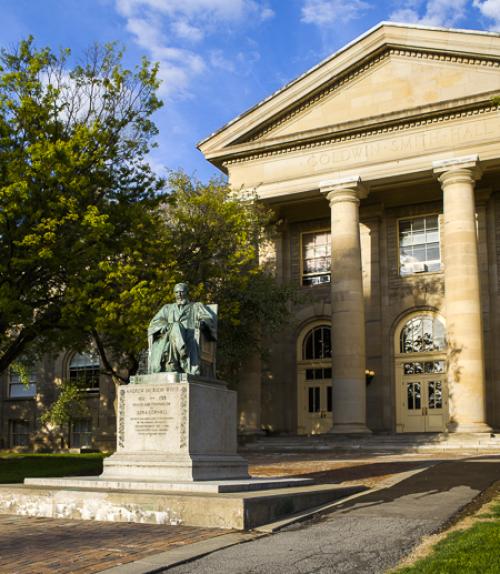A mathematician who has advised states and litigants on redistricting legislation will explore in an upcoming lecture whether race-blind, computational approaches to law and policy can improve fairness.
Moon Duchin, professor of mathematics and a senior fellow in the Tisch College of Civic Life at Tufts University, will give a University Lecture on “Algorithms, Race and Redistricting: Can Computers Find Fairness?” on Feb. 5 at 4:45 p.m. in Klarman Hall’s Rhodes-Rawlings Auditorium.
A prominent voice on fair redistricting, Duchin uses mathematical modeling to analyze the potential and actual outcomes of changes to policy and voting districts. She said policymakers should not take for granted that what is race blind or race neutral will have even-handed outcomes.
“We have a long legal history in the U.S. of curtailing the use of race to make decisions and regulations. This was put in place, of course, to prevent discriminatory policy,” Duchin said. “But the trend in the Supreme Court, heightened by its current makeup, is to be suspicious of all use of race, even to remediate past racial injustice.”
Duchin expects artificial intelligence will play a larger role in high-stakes public policy decision-making, as algorithmic decisions may be seen as a paragon of impartiality.
“It looks like the race-blind dreams of the court have led our legal system straight toward an embrace of computers as being able to certify neutrality of various kinds,” Duchin said. “The notion is that if you don’t tell a computer about some data, then it doesn’t know about that data, whereas it’s harder to control what people are taking into account when they make decisions.”
Duchin has served as an expert in recent redistricting litigation in Wisconsin, North Carolina, Alabama, South Carolina, Pennsylvania, Texas and Georgia, and she is working with local governments in Los Angeles and Portland, Oregon, on ranked-choice voting projects.
Her work focuses on geometry, topology, groups and dynamics, and how they intersect with civil rights, political science, law and public policy. She has received an NSF CAREER grant and a Guggenheim Fellowship, and is a fellow of the American Mathematical Society.
Analyzing what it means to be fairly represented in government and to live to the spirit of “one person, one vote” are fundamentally mathematical questions, which is why it is important to involve mathematicians in questions of public policy, said David Shmoys, the Laibe/Acheson Professor of Business Management & Leadership Studies in Cornell Engineering’s School of Operations Research and Information Engineering.
“[Duchin] is someone who has the gift for speaking across a broad range of audiences,” said Shmoys, who also directs Cornell’s Center for Data Science for Enterprise and Society. “The underlying substance may be mathematical, but the impact is very real. What she is fabulous at conveying is this sense of what the impact is of different sorts of decisions that could be made, and how might things have been different if different paths had been followed earlier on.”
Duchin will deliver an additional lecture, “A Systems View of Fair Elections,” on Feb. 2 at 3:45 p.m. in Bill and Melinda Gates Hall, Room G01, focusing on how modeling and mathematics can be part of the conversation about voting rights. She will also explore the new trend of ranked-choice voting. The talk is part of the Center for Applied Mathematics Colloquium and the Center for Data Science for Enterprise and Society’s Data Science Distinguished Lecture Series.
The Feb. 5 talk is part of the University Lecture Series and is co-sponsored by the Center for Data Science for Enterprise and Society and the Cornell Brooks School of Public Policy.





